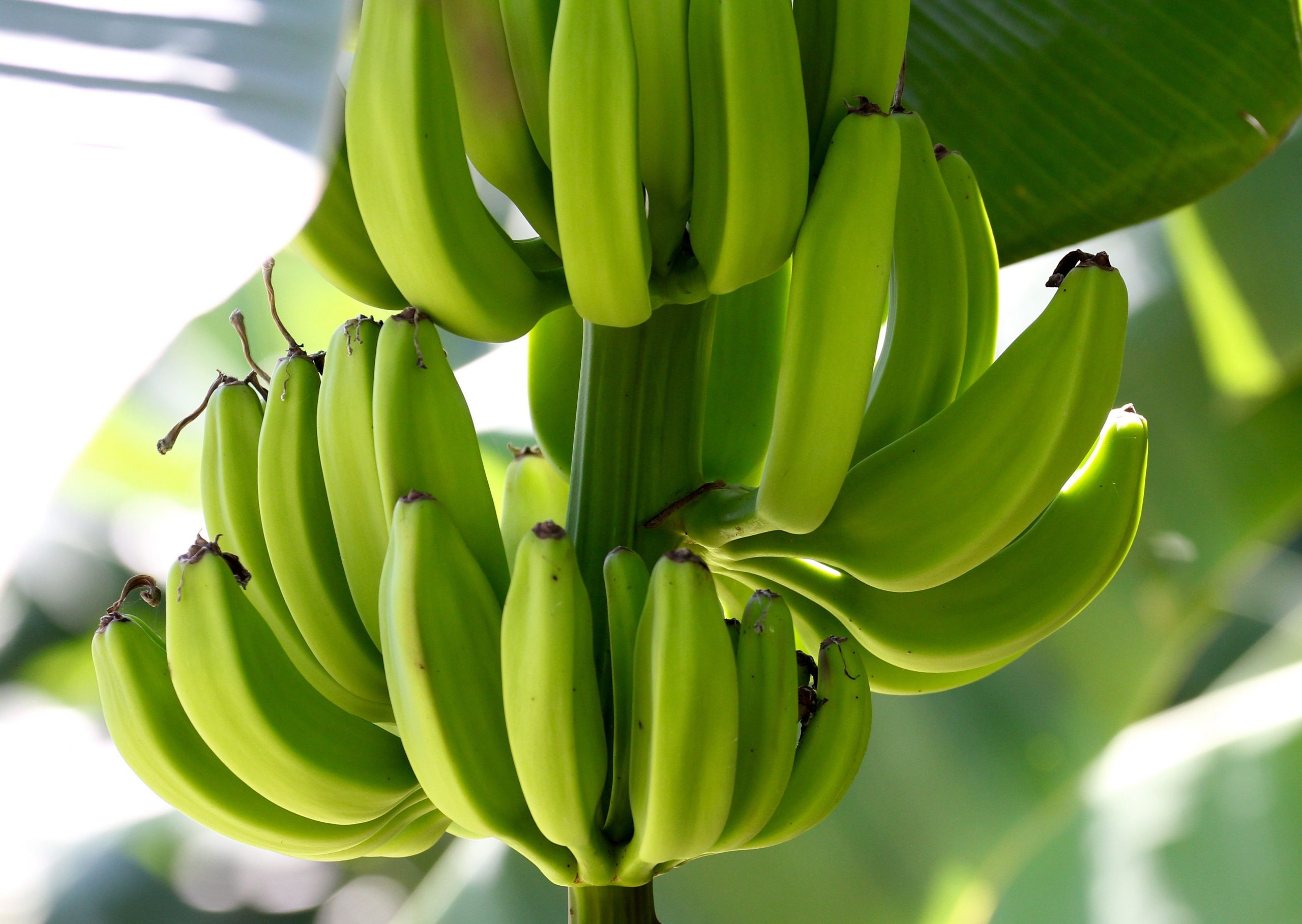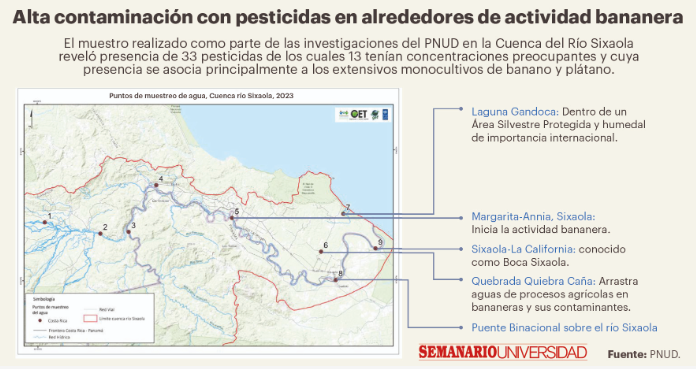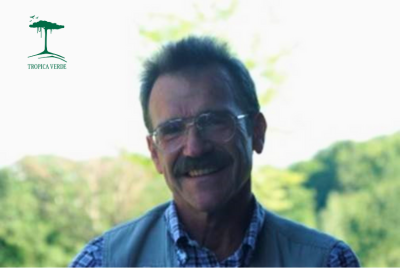All banana or what?
Interesting and critical facts about a crooked thing
This was the headline above an article by our project coordinator Dr. Stefan Rother, which appeared in the 1999 TROPICA VERDE SPECIAL about banana cultivation in Costa Rica – still very topical, because the structural problems of banana cultivation in huge monocultures have unfortunately worsened again after a phase of improvement:
- Deforestation of tropical forests for new farmland,
- massive use of pesticides in the plantations and from the air,
- Poisoning of water bodies, the sea and groundwater,
- Diseases among workers and the resident population, infertility, miscarriages,
- Decline in wildlife populations and loss of biodiversity

Specifically: tons of pesticides are applied to combat the more than 70 species of bacteria, fungi, worms and insects against which there are no natural enemies on the monocultures, which are washed into the streams during the frequent tropical rains. In addition, the banana trees are packed in blue plastic bags until harvesting, which are impregnated with pesticides but contaminate the workers during harvesting and in the washing facilities. Around 33,000 people live in this area and no longer have clean drinking water.
I would love to write here about the progress made in terms of reduced chemical use, more nature conservation and improved working and living conditions for employees, but we at Tropica Verde e.V. stand for transparency and education.
Heavy pollution with pesticides in the vicinity of banana plantations
According to a new study by the United Nations Development Program (UNDP) from 2019, 2022 and 2023, a cocktail of 33 pesticides was detected in the Sixaola border river and the Gandoca lagoon – a nature reserve – on the Caribbean side , 13 of which alone exceed the permitted levels by up to 24 times. Substances were detected whose use is banned in Europe and North America, but whose export to countries such as Costa Rica is still permitted. You can find more detailed information and the graphic below in this article from Costa Rica (Spanish).

For many years, Rainforest Alliance has been trying to improve the production conditions on the banana plantations in the Sixaola region with a certification system, but many farms continue to use pesticides in an uncontrolled manner:
The local authorities usually do not have the capacity to ensure the safe storage and transportation of these toxic pesticides. Many farmers do not have the knowledge and training to protect themselves from the risks that these products pose to their health and the environment. This has a devastating impact on ecosystems and biodiversity, as well as on the health of producers, workers and farming communities (report of 10.09.2021).
Although Costa Rica has designated many nature reserves for decades and has set up two important nature conservation authorities, MINAE and SINAC, ecotourism plays a major role and Costa Ricans are proud of their country’s positive image, this small country is the third largest exporter of pineapples and, together with Ecuador, one of the most important banana producers. And this has consequences for the environment, because according to a 2020 FAO survey, Costa Rica is the country with the highest consumption of agrochemicals in the world.
But how could this happen at all, despite the exemplary environmental protection laws? On the one hand, the local lower administrative level has neither the personnel resources for systematic monitoring with appropriate analytical methods and laboratories, nor the necessary sanctions against producers.
Dangerous pesticides to be banned
Even if these facts are shocking , the in no way diminishes our commitment to protect the tropical forests, wildlife and biodiversity as far as we can and to work for healthy and sustainable living and working conditions for the local population – including environmental education in schools.
There is currently hope for a bipartisan legislative initiative in Congress to finally ban the most dangerous pesticides and at the same time pay financial rewards to companies that reduce their use of chemicals.
El esfuerzo más significativo se trata de un reciente proyecto de ley presentado por la diputada Kattia Cambrionero con apoyo multipartidario que propone prohibición de plaguicidas altamente peligroso. (Source: PNUD)

In addition, a director of the Republic’s Environment Agency had some time ago obliged the government to issue national guidelines for the use of pesticides, which are to be drawn up with the involvement of the environment, agriculture and health ministries. However, this has still not happened due to profound conflicts of objectives. Here, export-oriented economic interests stand in opposition to the sustainable protection of health and the environment. We are also familiar with this conflict here.
The realization is only slowly growing that the banana and pineapple production practiced to date in monocultures with the excessive use of pesticides not only causes more harm than good for the country of Costa Rica, but will soon no longer be worthwhile for the producers themselves, as they are now caught in a vicious economic cycle :
- Price pressure: In order to survive the enormous price pressure from our fruit importers and the price collapse of the last 20 years, the focus was not only on increasing the volume of cultivation, but also on the mass use of pesticides to prevent crop losses due to pests.
- Lobbying: In addition, there is the fatal role of agrochemical companies such as Monsanto and Bayer with successful consulting and lobbying work to sell their products.
- Dependence: This in turn makes agro-producers highly dependent and also reduces their returns, which are already very low.
- Savings: Where could savings be made and profits improved? In terms of wages, most of the banana and pineapple production is carried out by day laborers from Panama and Nicaragua who work under poor conditions.
- At the same time, the EU and our consumers are rightly demanding healthy fruit without pesticide residues, with certification, with the TransFair seal and humane working conditions.
- World market: The US fruit multinationals Chiquita (formerly United Fruit), Dole (Standard Fruit) and Del Monte dominate two thirds of the world market from cultivation to the store counter.
- Distribution of the profits: the large corporations pocket almost a third of the retail price, which is usually between 0.99 and 1.50 euros per kilo. Around 40 percent goes to the retail trade, one sixth to the ripening company. Only a tenth remains for the plantations.
- Prices are depressed: Overproduction has been depressing prices for years. You can currently get a kilo for 79 cents at low-cost chains such as Aldi. Despite this, per capita consumption is falling in Europe and the USA.
- Susceptibility of the variety: Cavendish is currently the most cultivated variety – a hybrid without reproductive seeds. However, this variety is affected by a persistent soil fungus from Asia that threatens all monocultures worldwide. However, of the more than 1500 registered banana varieties, there are no fungus-resistant substitutes.
Are there ways out and solutions?
What led to a significant reduction in the use of pesticides in coffee, cocoa and melons years ago must now finally work for bananas too:
Away from monocultures and towards near-natural mixed agroforestry crops with trees, shrubs and ground cover. Away from the spray planes and plastic bags, towards direct injections into the plant. Away from mass production, which has led to oversupply and price collapse, towards adequate producer prices.
And this is where our German retail chains REWE, ALDI, LIDL and EDEKA are responsible, as they are the dominant importers who have forced prices to fall. The Supply Chain Act now obliges them to make a contribution to improving living and production conditions along the supply chain. As praiseworthy as individual flagship projects are (such as San San and Nogal by REWE) – as long as the toxic cocktail in the border river Sixaola has not been eliminated, there is no all-clear. We at Tropica Verde e.V. are staying on top of this issue.

Wolfgang Schmitt
BECOME A MEMBER
Nature, environmental and climate protection need a lobby now more than ever. With your membership you give us your voice for our work. The more members we represent, the stronger our standing vis-à-vis politics and business.
As a member of Tropica Verde you have many opportunities. You can get actively involved in the association’s work, volunteer at events and exchange ideas with like-minded people on topics such as rainforest protection, climate protection, environmental education and more. Or you can simply support our projects regularly with your membership fee and help to preserve the rainforest in Costa Rica in the long term. By becoming a member of Tropica Verde, you are promoting sustainable climate protection and helping us to continuously develop and expand conservation projects.
